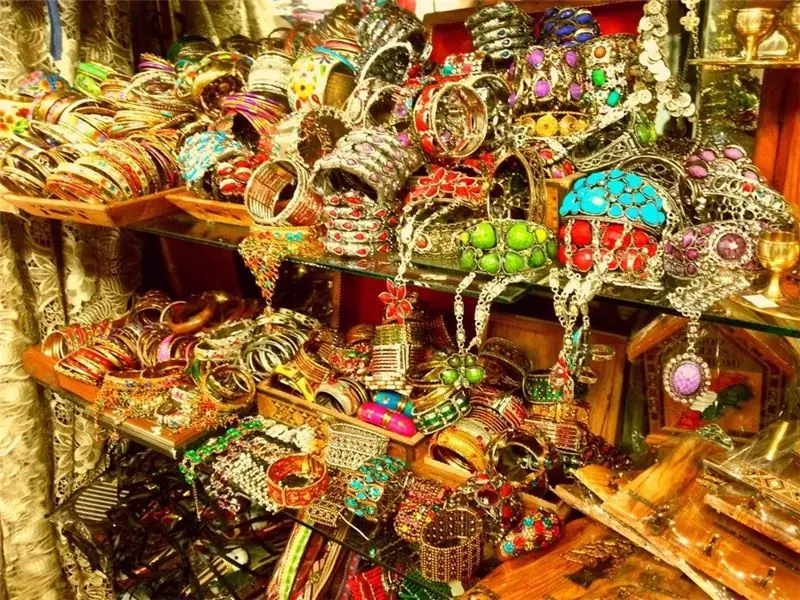
- Lebanese main shopping cities
- What to bring ethnic Lebanon?
- Delicious Lebanon
The countries of the Middle East are in no way inferior to their European counterparts in the matter of trade, shopping in Beirut can be as interesting as in Paris. And even better, because when asked what to bring from Lebanon, you can give a long list of goods. Moreover, most of them will reflect the ancient history of the country, have a national character, while most of the Parisian souvenirs are clearly made behind the Great Wall of China.
Lebanese main shopping cities
It is clear that the widest range of goods awaits Lebanese guests in Beirut; at the moment, purchases can be carried out not only in the historical center of the city, but also in other quarters. Experienced tourists name three shopping centers:
- Varda - an area of expensive boutiques;
- Burj Hamud, famous for its gold markets and affordable shops in the Armenian quarter;
- Hamra - the former main "street of the red light", and now a shopping area for inexpensive clothes and shoes.
In the Varda area you can find shops of the most famous European and American brands, including Fendi, Hermes, Prada, Gucci and others. Tourists make purchases not only in Beirut, but also in other cities of the country, for example, in Tripoli, the second largest settlement in Lebanon, which is sometimes confused with the capital of Libya due to the coincidence of the name. The town of Byblos offers to buy chic embroidery, the work of local craftswomen. In the same town, there is a huge selection of multi-colored yarn for those who themselves know how to hold knitting needles and a hook in their hands.
What to bring ethnic Lebanon?
Firstly, like any other Middle Eastern country, Lebanon offers traditional Arab souvenirs that are associated with the Muslim religion (rosary), culture (hookahs and robes), gastronomy (Turks for brewing coffee and, accordingly, the fragrant drink itself in beans or ground with cardamom). In addition, things with a pronounced Libyan character are offered to the guests of the country:
- sewing offered by the craftswomen of Shuf, one of the mountainous regions of Lebanon;
- fragile glass items from Sarafand, which has long been famous for its glass-melting workshops;
- knives from Jezzine, now a well-known resort at home and abroad.
But the most important souvenir is the Lebanese cedar. It is known as the material from which Noah built his famous ark. Today, this evergreen coniferous tree is on the verge of destruction due to its active use in the economy. You can see many different cedar souvenirs on sale, but, as experienced guests note, the quality of the products leaves much to be desired.
Local craftsmen have reached heights in another very specific art form - they pour colored sand into narrow glass containers. At the same time, beautiful paintings with an oriental flavor are formed, for example, a camel that moves in the desert, or a landscape depicting a sunset on the sea coast. Firstly, it is a pleasure to watch the work of such a master, and secondly, many have a desire to take this beauty home. Unfortunately, the latter is quite difficult to do, although the sand is tamped in containers, long-distance flights can affect the quality of the drawing.
The Lebanese are an enterprising people, this is evidenced at least by the fact that in the vicinity of Byblos and another small town of Hajul, they learned to find fossilized skeletons of fish left after the world ocean left. Found valuable artifacts, fish skeletons and the remains of other aquatic life, residents sell to curious tourists along with certificates of authenticity.
Delicious Lebanon
Leaving the country, many foreign tourists take with them local products, primarily wine and the famous oriental sweets. Historians believe that winemaking originated in ancient Phenicia, located on the territory of modern Lebanon, and even then enjoyed incredible popularity among the Greeks and Romans.
In the Middle Ages, due to the frequent raids of conquerors from different countries, including Muslims, winemaking fell into decay. This industry received a second wind only in the second half of the 19th century, helped in this by the French missionaries, who, in addition to preaching, planted vineyards, were engaged in the production of delicious grape wine. At the moment, two wine-making houses are competing with each other - "Ksara", operating since 1857, and "Kefraya", organized a century later (in 1978), but developing very actively.
Sweets are the second favorite product of overseas guests, imported from Lebanon in huge quantities. Local pastry shops allow free sampling of cookies and baklava, so tourists have the opportunity to taste and choose all the most delicious. Interesting purchases with a national character and a sweet aftertaste remain in memory of a visit to Lebanon.






